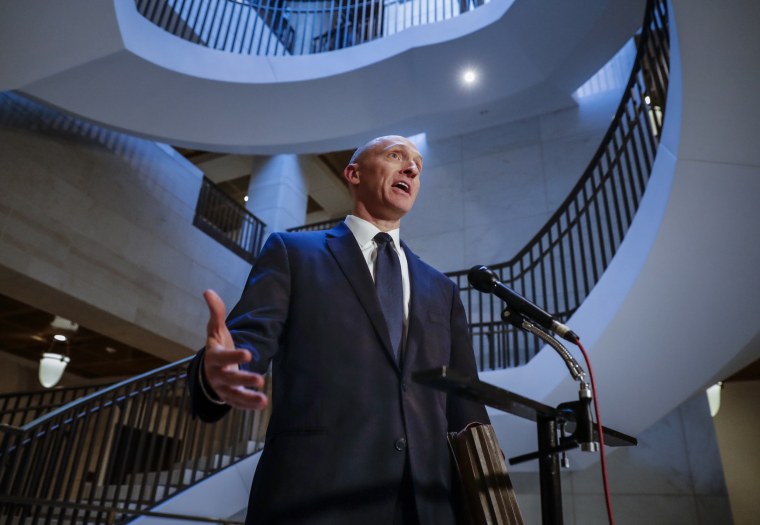WASHINGTON — The Justice Department has concluded that two of the four court orders allowing the FBI to conduct secret national security surveillance on former Trump campaign aide Carter Page were not valid because the government made "material misstatements" in obtaining them, according to a newly declassified judicial order.
The disclosure by James Boasberg, the top judge on the Foreign Intelligence Surveillance Court, underscores the extent to which the FBI bungled its handling of a highly sensitive case, a failure that is continuing to have serious policy and political repercussions.
The order says the department told the court it now believes it did not have probable cause to believe that Page was acting as an agent of a foreign power, which was required to obtain the surveillance.
The Justice Department did not immediately respond to a request for comment. The FBI declined to comment.
In December, a scathing report by the Justice Department's inspector general found that the FBI's applications to spy on Page were rife with "factual misstatements and omissions," and in the weeks since, the FISA court has demanded an accounting from the Justice Department on how that happened and what is being done about it.
Politically, the scandal has energized President Donald Trump and his allies on the right who long insisted that the Russia investigation was a bogus exercise. On the policy front, the exposure of FBI wrongdoing has created a momentum for change in the way the bureau obtains authorization to conduct national security surveillance.
The inspector general, Michael Horowitz, found no evidence that political bias played a role in the opening of the Russia probe, which failed to establish that the Trump campaign colluded with Russia. But he also said he found no satisfactory alternative explanation when it came to the lies and omissions that led a court to wrongly authorize spying on Page, who was not charged with a crime.
The FBI in December proposed a series of fixes in how it approaches the secret warrants, but an expert appointed by the FISA court, David Kris, said in a brief this month that the proposed reforms do not go far enough. For example, Kris wants a field agent assigned to a case, not an FBI supervisor, to sign any FISA warrant application so that agent will be personally responsible for the warrant's accuracy.
The inspector general's report and its fallout are a blow to House Intelligence Committee Chairman and lead impeachment manager Adam Schiff, who said after reviewing classified documents that the FBI's process for obtaining FISA warrants was solid. Schiff and other Democrats also insisted that the FBI did not rely to a great extent on an opposition research dossier compiled by a former British spy, but the inspector general found that the dossier played a key role in the FBI's decision to obtain the warrants.
Asked for comment, Schiff's spokesman, Patrick Boland, pointed to a statement Schiff released in response to the inspector general report. The statement, however, did not address his past assertions about the FISA process and the dossier.
In December, asked whether he would acknowledge he was wrong about the FISA process, Schiff told ABC News, "I certainly accept that two years later, 170 interviews later, and 2 million documents later, the inspector general found things that we didn't know two years ago. And I certainly concur with the inspector general's conclusion that there need to be significant changes to the FISA process. We just didn't have that evidence available two years ago."
All told, the FBI obtained four orders to conduct surveillance of Page — the original order and then three renewals. When Judge Boasberg disclosed in his opinion, dated Jan. 7, that the Justice Department had found two of the four orders to be invalid, he also said the Justice Department did not take a position on whether the remaining two were valid.
It was not clear from Boasberg's own court order which two FISA orders were deemed invalid, but it's likely they were the final two renewals. According to the inspector general's report, the FBI had reason by then to doubt the British spy's information, and it had learned that Page had been cooperating with the CIA.
The judge said the FBI agreed to "sequester" the fruits of the Page surveillance, but did not explain what that meant.
He demanded that the FBI provide the court a more detailed description of exactly what it would do with the information gathered from Page, which is likely to include emails, texts and transcripts of phone calls.

